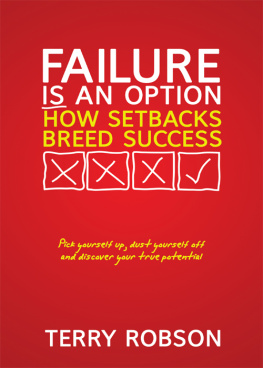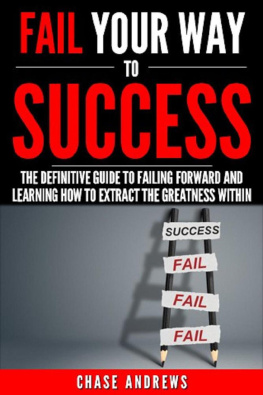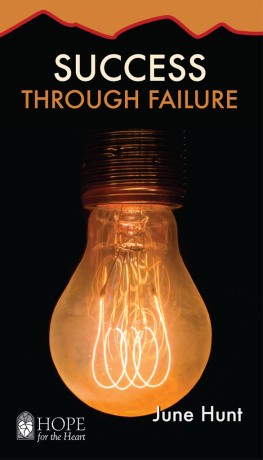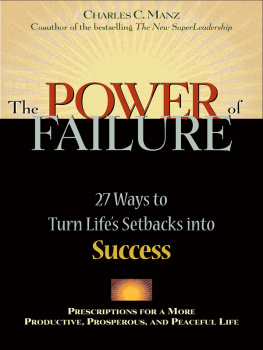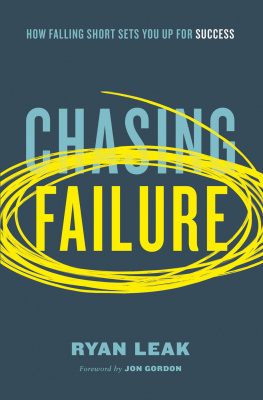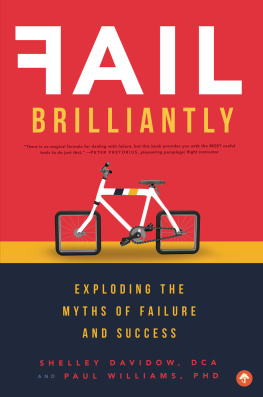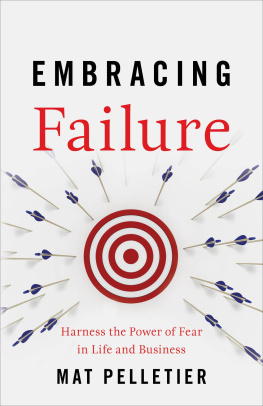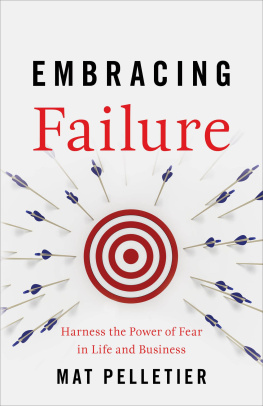
Nothing succeeds like failure
A brief history of failures role in success
We live in a failure-phobic society. We worship success and seek it at all costs. This has become enshrined in popular culture phrases like Failure is not an option. In fact, however, failure is always an option and what is more, that is not a bad thing. Hence the title of this book because what we will seek to establish is that first of all failure is an option and secondly that it is a necessary part of life. Unfortunately, we are so desperate to avoid failure that we dont really have learned strategies to deal with failure when it comes along and so the failure becomes a devastation because we dont know how to deal with it. So an additional aim of this book will be to provide you with strategies for meeting and moving on from failure in the healthiest and most productive way possible.
To achieve this we have interviews with ten high-profile and successful people from areas including business, sport, film, novel writing, journalism, comedy, broadcasting, and the music industry. We will refer to these wonderful people as personalities for want of a better word. What is the collective noun for a group of extraordinary people who willingly share with a public audience the reality of their dark and glorious times? A truth of extraordinary people? In any event, accepting linguistic defeat for a moment, the chapters on these well-known people will show that successful individuals, like everyone else, do experience failure, and will delve into how successful people greet that inevitable companion failure when it travels beside them for a while.
In addition we will have more chapters that look at how you can deal with failure when it arrives in your life. For these chapters I have interviewed leading people coming from psychological and spiritual perspectives to give you as broad a view as possible as to what is right for you. These life experts include a Buddhist nun, a Christian minister, a Sufi psychologist, a yoga practitioner, a lecturer in psychology and two life and business coaches. In arriving at this diverse group I wanted to have input from people who had dealt with, thought about, meditated on, or prayed about the topics that I would be addressing. I wanted the process of finding them to be somewhat organic without simply sitting back and twiddling my thumbs waiting for the right people to appear. I had an idea of some people that I would definitely approach and also had a few areas of thought and belief from which I hoped to find people who could contribute.
In many ways I followed that oft-quoted dictum from the Kevin Costner film Field of Dreams: Build it and they will come. I like this because it suggests that you do magnetise things to you in life but that the magnetising process is not just wishing: you must actively create (or build) something that will draw the people and things that you need. In this case I was building the book through research and interviews and gradually the appropriate people came along. In the end all of the experts consulted here were eager and passionate about the subject. They have provided valuable, disparate and frequently overlapping points of view. Having woven all of these elements together what you have in this book is a powerful tool that yes, is a guide to dealing with failure, but is also a pretty handy tool in helping you to learn to live fully and joyously.
View from above
Failure is a not very useful word or concept to describe things that happen to us. It really means things not working out as we had planned. The news is this is going to happen to everyone. The problem is all of the negative connotations that we hang on failure which prohibit you from engaging with it enough so that you can deal with it when it occurs.
What we term failure is really just a part of the process of being alive yet we have such a perjorative idea of it. The negative results that stem from labelling something a failure include self-doubt, self-loathing, mistrust of others, blame of others, mistrust in the world, an outlook of pessimism, lack of belief in the goodness of life the list could go on. All of these gremlins of thought inhabit your midnight musing and do not contribute to a satisfying and productive life. The most tragic aspect of this is that lives are undermined either by failure or by trying to avoid it when failure is in fact, a kind friend.
What we look at as failure is really just a component of life and therefore of success and of everything else. To encourage our minds to inhabit this new space as regards failure, lets take ourselves high above the timeline of humanity and see how failure played a role in one of the great military successes of history, one of the most influential films ever made, and, believe it or not, in bridge building.
Henry V and Agincourt
The battle at Agincourt in 1415 between the English army under Henry V and the French forces has become synonymous with success against the odds from an English point of view. Although there is dispute amongst historians as to exact numbers, it seems reasonable that approximately 6000 English faced off against approximately 30,000 French on 25 October 1415 at Agincourt. Albeit that the English had the usual advantage afforded them via their longbows and the men who used them, it is generally agreed that the French superiority of numbers should have been enough to nullify even that often devastating weapon. The English won a famous victory largely due to muddy fields and poor French tactics. The French charges became bogged in the extremely sodden fields of Agincourt on that day. In addition, their lack of battlefield coordination left them unable to make full use of their numerical superiority. It was a political victory for Henry more than anything else and plunged France into decades of political turmoil. Yet almost 600 years later Agincourt remains a symbol of success to the English. This is largely due to the wild disparity in numbers of the engaging forces and also to the kick along Shakespeare gave it almost two centuries later when he put on Henrys lips the famous, We few, we happy few speech in his play Henry V. So Agincourt retains the lustre of success centuries after it occurred but what is not so widely known is that it was immediately preceded by a military failure.
Henrys first objective when he arrived in France with his army was to capture the port city of Harfleur. The people and garrison of Harfleur settled in behind their walls and Henry was forced to lay siege. In the course of the protracted siege Henrys army was savaged by illness and although Harfleur was eventually won, Henry had lost half his army on what was intended to be an easy beginning to the French campaign. So great were the English losses at Harfleur that many of Henrys advisors wanted him to go home. That would have been humiliating to Henry, who had spent a fortune on this French sortie. Against all advice which was to accept the failure at Harfleur and return home Henry decided to march what was left of his army through France to Calais before returning to England. This was probably a show of bravado more than anything. After the failure of Harfleur Henry needed to regain some respect by showing that he could march through France untouched. Henry did not want a battle. His army was depleted and tired. He was forced to make a detour on his way to Calais in order to avoid a band of French troops and this brought him to the major French force at Agincourt. The rest is history: the English prevailed and the French were demoralised. Yet Agincourt would never have happened in the way it did had Henry not failed so miserably in his siege of Harfleur. One of the great emblematic military successes only occurred because of a failure.

